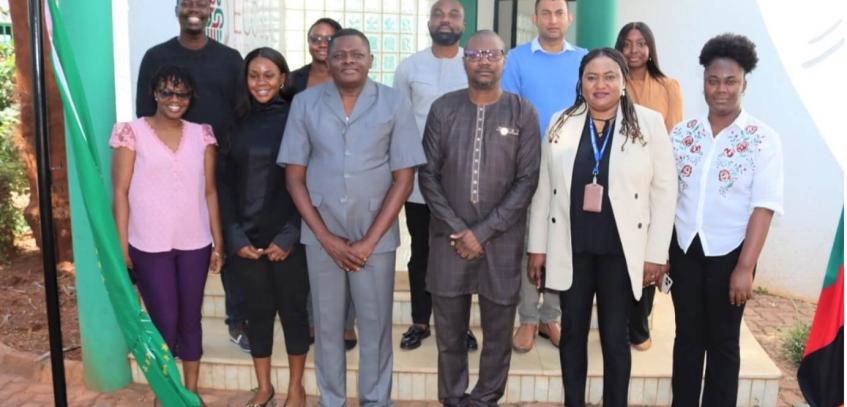A delegation from the Southern Regional Desk of the Conflict Management Directorate (CMD) of the African Union Commission’s Department of Political Affairs, Peace and Security (PAPS), undertook a working visit to the African Union Economic, Social, and Cultural Council (ECOSOCC) Secretariat in Lusaka, Zambia, from May 1-3, 2023. The working visit was founded on the critical necessity to contribute to the formation of a civil society coalition capable of effectively addressing the multifaceted security issues confronting the southern region of Africa. Furthermore, the meeting was called in direct response to the recommendations and findings from the PAPS Southern Regional Coordination's working visit to the Southern African Development Community (SADC) Headquarters in Gaborone, Botswana in 2022, as presented by the SADC Regional Early Warning Centre (REWC).
The meeting explored and identified areas of synergy between ECOSOCC and CMD/PAPS, with particular reference to the creation of a civil society coalition on peace and security in the SADC region. The proposed CSO coalition is expected to support the PAPS Directorate with a comprehensive understanding of civil society activity in the peace and security sector in the SADC Region. In addition, it will provide a platform for CMD/PAPS to engage CSOs in the SADC region through capacity building in conflict prevention, early warning, and support for peacekeeping operations in Southern Africa. With diverse stakeholders and key players coming together, a coalition of this nature would pave the way for the region to adopt a more participatory model for conflict prevention, crisis management, and peacebuilding.
The two parties agreed to work together to establish a mechanism that would allow CSOs to provide policy and report input to the work of PAPS, building on the existing relationship between African CSOs and the Peace and Security Council (PSC). This initiative presents a compelling opportunity for CSOs to make contributions to the State of Peace and Security in Africa Report, presented annually to Heads of State and Government during the African Union Summit. Specific areas of collaboration identified during the joint session included the role of CSOs in the complex interplay between climate change and peace and security, a recurrent issue that underscores the need for constructive engagement and profound insights from CSOs, particularly Community-Based Organizations (CBOs) in countries within the SADC Region that are particularly vulnerable to the effects of climate change. Another area of synergy focused on joint action within the Regional Early Warning Mechanism (REWC), with emphasis on building the capacity of SADC-based CSOs in early warning and conflict prevention. By partnering with CSOs and leveraging the REWC's expertise, PAPS/CMD would be better positioned to equip regional actors to identify and address potential conflicts before they escalate.
As part of the joint planning towards the establishment of a SADC civil society organizations coalition, the two sister institutions agreed to convene, in the coming months, a high-level consultative process bringing together the AUC, ECOSOCC, SADC, and select regional CSO networks with a track record of impactful operations within the peace and security space in Africa, including the West Africa Network for Peacebuilding (WANEP) and the Community of Practice for Africa Conflict Prevention (COPAC).
The consultation is envisaged to promote an exchange of ideas and lay the groundwork for the development and operation of an autonomous professional network of Southern African CSOs engaged in early warning and conflict prevention.
In conclusion, the working visit was a critical step in the journey to build a resilient Southern Africa, capable of withstanding conflicts and security threats. The concerted efforts of the AU, ECOSOCC and SADC represent a proactive approach to conflict prevention and peacebuilding by engaging relevant stakeholders in the region. These joint efforts bear testament to the commitment of the AU to foster a peaceful and secure Africa, as articulated in Aspiration 4 of Agenda 2063. By fortifying an energized civil society coalition, the region will be better positioned to confront emerging security challenges while simultaneously fostering sustainable and integrated development.





